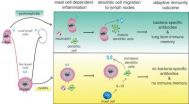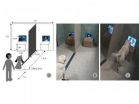(Press-News.org) DURHAM, N.C. – Recurrent bladder infections, which are especially common among women, may result from a defect among the bladder's immune fighters that keeps them from remembering previous bacterial infections. The immune memory lapse can hamper a timely and effective attack, according to researchers at Duke Medicine and Duke-National University of Singapore.
Their study, which involved mice, may provide a new route to develop vaccines and treatments for urinary tract infections, which are the second-most common infection and account for more than 8 million health care visits a year in the United States, according to the National Institutes of Health.
"A third of recurring bladder infections are from the same strain of bacteria, so that suggested to us that there is some sort of defect in the bladder that is causing this," said Soman N. Abraham, PhD, professor of pathology at Duke and Duke-NUS and senior author of the paper published Feb. 14, 2013, in the journal Immunity. "We have identified how a muted immune response to bacterial infections in the bladder occurs, making it unable to fully eradicate a persistent population of bacteria."
Like the gut and the liver, the bladder is involved in waste treatment, and is frequently exposed to bacterial invasion. But it has not been among the organs considered "immune privileged," in which the immune system operates under special strategies for tolerating certain pathogens to keep it from over-activating. Not much is understood about how the mucosal tissue in the bladder functions.
Abraham and colleagues examined mouse bladders under conditions that closely mimic human infections; infections remained in the bladder for some, and traveled to the kidneys in others. In both cases, they found that urinary tract infections were typically met with a robust inflammatory response from the innate immune system, which is the body's first line of defense and attacks all pathogens in a generalized fashion.
After 21 days, both sets of mice were re-infected, and here the groups diverged. In the mice that originally had an infection in both the bladder and kidney, a strong antibody response arose, indicating that the immune system recognized the invader and could swiftly eradicate it. But among those that originally had just the bladder infection, the immune system showed no memory recall.
The cause was an unlikely source: Mast cells. Best known for fighting allergies, mast cells are responsible for triggering an early immune response against bacteria in the bladder, and in every instance, they sprung to action when confronted with the E. coli infection. But in some cases, they then began producing a molecule called interleukin-10, which suppresses the immune system. It was if the immune system slammed on brakes, so the adaptive immune system never kicked into action to form antibodies that would recognize a recurring invasion.
Abraham said this function of mast cells to limit the immune response may coincide with the shedding of the bladder's lining cells – a sort of cleansing mechanism that keeps bacteria from accumulating in the epithelial lining – and may be part of the bladder's form of immune privilege to temper the inflammatory response.
"It appears that the bladder, like the gut, has a highly specialized strategy for balancing tolerance and resisting infection," Abraham said. "In most cases, muting the adaptive immune response in the bladder would not be a problem, because the infection would be cleared by the vigorous response of the early, innate immune response. But in some people, it's causing recurrent infections, because the bacteria hide in the epithelium and are not recognized by the adaptive immune system," Abraham said.
Abraham said the findings could lead the development of vaccines against the bacteria, or better treatments that bolster the antibody response.
INFORMATION:
In addition to Abraham, study authors include Cheryl Y. Chan of Duke University Medical Center and Ashley L. St. John of Duke and Duke-NUS.
The study was support by grants from the NIH (R01 A135678, R01 DK077159, R01 A150021, R37 DK50814 and R21 A1056101).
GRAPHIC: Bladder infections that travel to the kidneys result in an immune response that builds antibodies to recognize and attack the pathogen. When the infection remains in the bladder, however, the immune response is led by mast cells, which initially fight the infection but also produce an immune suppressing molecule called interleukin-10 that disrupts the development of antibodies and thus stifles immune memory.
Defect in immune memory may cause repeat bladder infections
2013-02-14
ELSE PRESS RELEASES FROM THIS DATE:
Discovery in HIV may solve efficiency problems for gene therapy
2013-02-14
A research team from Case Western Reserve University School of Medicine has discovered an approach that could make gene therapy dramatically more effective for patients.
Led by professor Eric Arts, PhD, the scientists discovered that the process of gene therapy is missing essential elements thereby reducing the effectiveness of this treatment. Re-introducing this element into their model system suggests that improvements for gene therapy areon the horizon.
The findings are detailed in the article, "A new genomic RNA packaging element in retroviruses and the interplay ...
Study tracks leukemia's genetic evolution, may help predict disease course, tailor care
2013-02-14
BOSTON AND CAMBRIDGE, Mass.––Tumors are not factories for the mass production of identical cancer cells, but are, in reality, patchworks of cells with different patterns of gene mutations. In a new study, researchers at Dana-Farber Cancer Institute and the Broad Institute show, more fully than ever before, how these mutations shift and evolve over time in chronic lymphocytic leukemia (CLL) – providing a strobe-like look at the genetic past, present, and future of CLL tumors.
Their report, which will be published online today by the journal Cell, suggests that evolution ...
Gene invaders are stymied by a cell's genome defense
2013-02-14
Gene wars rage inside our cells, with invading DNA regularly threatening to subvert our human blueprint. Now, building on Nobel-Prize-winning findings, UC San Francisco researchers have discovered a molecular machine that helps protect a cell's genes against these DNA interlopers.
The machine, named SCANR, recognizes and targets foreign DNA. The UCSF team identified it in yeast, but given the similarity of yeast and human cells, comparable mechanisms might also be found in humans, where they might serve to lower the burden of inherited human disease and death, the researchers ...
Environment schemes for kids influence parents' behavior
2013-02-14
Teaching children about the environment can affect the knowledge and behaviour of their parents, according to new research.
Scientists from Imperial College London surveyed the families of 160 schoolchildren in the Seychelles, some of whom took part in educational activities about the island's valuable wetland resources.
They found that the parents of children who took part in the wetland activities were more knowledgeable about wetlands and, were more inclined to undertake 'environmentally friendly' behaviours such as conserving water in their homes.
The findings ...
Our primitive reflexes may be more sophisticated than they appear, study shows
2013-02-14
Supposedly 'primitive' reflexes may involve more sophisticated brain function than previously thought, according to researchers at Imperial College London.
The Vestibular-Ocular Reflex (or VOR), common to most vertebrates, is what allows us to keep our eyes focused on a fixed point even while our heads are moving. Up until now, scientists had assumed this reflex was controlled by the lower brainstem, which regulates eating, sleeping and other low-level tasks.
Researchers at Imperial's Division of Brain Sciences conducted tests to examine this reflex in left- and right-handed ...
Indian plant could play key role in death of cancer cells
2013-02-14
AUGUSTA, Ga. – Scientists at the Georgia Regents University Cancer Center have identified an Indian plant, used for centuries to treat inflammation, fever and malaria, that could help kill cancer cells.
Cancer cells typically avoid death by hijacking molecular chaperones that guide and protect the proteins that ensure normal cellular function and then tricking them into helping mutated versions of those proteins stay alive, says Dr. Ahmed Chadli, a researcher in the Molecular Chaperone Program at the GRU Cancer Center and senior author of the study named the Journal ...
New LA BioMed research identifies effective treatment for common gynecological problem
2013-02-14
LOS ANGELES (Feb. 14, 2013) – New research from the Los Angeles Biomedical Research Institute (LA BioMed) found a progestogen-only treatment halted bleeding in women suffering from extremely heavy periods, according to the study published online by the American Journal of Obstetrics and Gynecology.
"Excessive uterine bleeding is a common problem we see in gynecological practices and emergency rooms. It can interfere with women's daily activities and put them at risk for anemia and other more serious health consequences caused by blood loss," said Anita L. Nelson, MD, ...
Love of musical harmony is not nature but nurture
2013-02-14
Our love of music and appreciation of musical harmony is learnt and not based on natural ability – a new study by University of Melbourne researchers has found.
Associate Professor Neil McLachlan from the Melbourne School of Psychological Sciences said previous theories about how we appreciate music were based on the physical properties of sound, the ear itself and an innate ability to hear harmony.
"Our study shows that musical harmony can be learnt and it is a matter of training the brain to hear the sounds," Associate Professor McLachlan said.
"So if you thought ...
Dogs spot the dog
2013-02-14
Dogs pick out faces of other dogs, irrespective of breeds, among human and other domestic and wild animal faces and can group them into a category of their own. They do that using visual cues alone, according to new research by Dr. Dominique Autier-Dérian from the LEEC and National Veterinary School in Lyon in France and colleagues. Their work, the first to test dogs' ability to discriminate between species and form a "dog" category in spite of the huge variability within the dog species, is published online in Springer's journal Animal Cognition.
Individuals from the ...
Combining quantum information communication and storage
2013-02-14
Aalto University researchers in Finland have successfully connected a superconducting quantum bit, or qubit, with a micrometer-sized drum head. Thus they transferred information from the qubit to the resonator and back again.
- This work represents the first step towards creating exotic mechanical quantum states. For example, the transfer makes it possible to create a state in which the resonator simultaneously vibrates and doesn't vibrate, says professor Mika Sillanpää from Aalto University, who runs the research group.
A qubit is the quantum-mechanical equivalent ...






